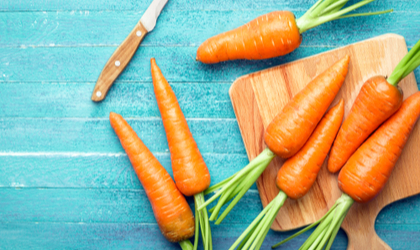
An important macronutrient, protein is found in every cell in the body – from your skin and bone to your hair and muscle. Protein constitutes twenty basic building blocks called amino acids. Since our body can’t store amino acids, it has to produce them in other ways: from food, or by modifying other amino acids. Your body needs a ready supply of protein to ensure it stays healthy and operates optimally.
Here, we take a closer look at why protein is so indispensable to good health. You can also find out how to meet your protein quota on a vegetarian and vegan diet.
Why do we need protein?
Protein isn’t just the preserve of bodybuilders and gym buffs. We all need protein to build muscle, as well as repair damaged cells, such as those found in our hair, skin, nails, organs, bones and bodily fluids. If we don’t get enough protein, our body won’t be able to rebuild itself and will start to lose muscle mass.
Aside from muscle repair and growth, protein also plays an important role in various bodily functions, such as vision, fluid balance, blood clotting, immunity, and brain function.
You can find out more about the benefits of protein here
How much protein do I need daily?
In the UK, all adults need 0.75g of protein per kilogram of weight. However, this requirement will often vary throughout your lifetime depending on your circumstances. For instance, if you lead a relatively sedentary life, you’ll need less protein than an athlete in training.
In general, men are advised to eat around 55g of protein daily, whereas women need roughly 45g each day.
Sources of protein
The natural world is full of protein sources. You can find protein in both animal and plant-based foods. You can also supplement your diet with protein powders and bars, which can be a convenient way to top up your reserves and support sports performance or weight loss goals.
What food is high in protein?
Many of us veer into lazy stereotyping and assume that meat, fish and dairy are the only foods that contain the highest levels of protein. But it may surprise you to learn that some plant-based sources actually rival their animal-based counterparts.
Here are some of the highest sources of protein in food (per 100g):
-
Parmesan (32g)
-
Tuna steak (32g)
-
Pumpkin seeds (30g) vg
-
Turkey (30g)
-
Peanuts (30g)
-
Cheddar cheese (25g)
-
Seitan (25g) vg
-
Chicken (24g)
-
Salmon (24g)
-
Almonds (21g) vg
-
Mackerel (20g)
-
Tempeh (20g) vg
-
Chia seeds (17g) vg
Protein supplements
To support sports performance goals, tone up, or simply supercharge protein levels, many people choose to take supplemental protein in the form of powders and bars.
Protein powders typically derive from milk, such as whey or casein. However, there’s also been a recent trend towards plant-based protein powders, which often comprise pea, hemp, or other hulled nuts and seeds. If you’re looking to build muscle on a plant-based diet, but don’t want to eat bowls of tofu and beans, then a vegan protein supplement may be a useful addition.
Although most people consume their protein shake after a workout, choosing to have it before exercise – and even up to 24 hours afterwards – can still be effective, depending on your fitness goals. With formulas delivering anything from 15-30g, protein powders are a helpful way to support muscle recovery and growth.
Protein powder can also be used in fruit and vegetable smoothies. For tasty recipes, please click here. Protein bars are also a convenient way to replenish your stores, especially when on the go.
What is the difference between Creatine and Protein?
Creatine is another popular supplement in the world of sports nutrition. Like whey protein powder, creatine is known to support exercise performance and recovery, as well as increase muscle gains. But while these supplements accomplish similar outcomes, they differ in the way they operate.
Naturally produced in the body and mostly located in the muscles, creatine comprises three amino acids: arginine, glycine, and methionine. This substance increases the body’s store of ATP (energy currency), which delivers more energy to the muscles and fuel for growth, strength endurance, and power [1].
Whey protein, by contrast, is a dairy protein that contains all nine essential amino acids. As a high-quality protein source, whey increases muscles growth and strength [2].
Both creatine and whey protein enhance your athletic performance in different ways.
-
Muscle gain: Creatine builds muscle mass and strength by improving your capacity to exercise. Whey protein, on the other hand, promotes muscle gains by enhancing muscle protein synthesis.
-
Exercise benefits: Creatine helps you exercise for longer and harder, as well as enables quicker muscle growth. Whey protein, contrastingly, supports rapid muscle growth and repair, ensuring a quick recovery from DOMS (Delayed Onset of Muscle Soreness).
-
Timing: For optimal results, it’s best to take creatine 30 minutes before your workout. Meanwhile, whey protein functions best as a post-workout supplement since it’s involved in muscle repair.
Ultimately, creatine creates more explosive power and force, improving your overall athletic performance, whereas whey protein provides the amino acid support to build and repair your muscles quickly.
If you’re looking to turbocharge your fitness goals, we recommend taking a combination of protein and creatine as they work synergistically in the body.
Vegetarian and vegan protein sources
Many people are quick to assume it’s impossible to get enough protein on a vegetarian or vegan diet. However, the world of plant-based food is actually teeming with protein. And if you plan your diet carefully – ensuring there’s a high-quality source of protein at each meal and snack – you should easily meet your recommended daily allowance of protein.
Vegetarian sources of protein
Most nutritionists agree that eating a vegetarian diet can satisfy all of your nutritional needs, including protein.
Here are some of the best vegetarian sources of protein.
-
Eggs (a single hard-boiled egg contains 7g of protein!)
-
Yoghurt, especially Greek yoghurt
-
Cheese
-
Milk
Those on vegetarian diets can eat all of the plant-based foods outlined in the section on veganism below, too.
Sources of vegan protein
Contrary to popular thought, a vegan diet isn’t devoid of all protein. With some careful preparation, you can still hit every nutritional note on a well-balanced plant-based diet.
Here are some of the best sources of protein in food for vegans:
-
Tofu
-
Tempeh
-
Setian
-
Edamame beans
-
Nuts and seeds (peanuts, Brazil nuts, almonds, and chia seeds)
-
Nut butter (peanut butter, almond butter, and cashew butter)
-
Beans (black beans, kidney beans, and aduki beans)
-
Peas (chickpeas, garden peas)
-
Whole grains (quinoa, brown rice, pearl barley, and sprouted grain bread)
-
Dairy-free milk (soya milk, almond milk, and cashew milk)
There are also plenty of creative ways to supercharge the protein content of your plant-based meals and snacks.
-
Sprinkle mixed seeds on soups
-
Top salads with tofu
-
Throw some roasted nuts on porridge
-
Add nutritional yeast to popcorn
-
Pair fresh fruit with nut butter
-
Eat crudities with hummus
-
Add a dollop of nut butter to smoothies
It is, however, worth mentioning that not all protein is created equal. Unlike animal-based foods, most plant-based sources are ‘incomplete’ proteins, meaning they don’t have the full spectrum of amino acids.
As we’ve already mentioned, protein comprises building blocks called amino acids. In total, we need twenty amino acids to support our health: nine essential amino acids and eleven non-essential amino acids. The only way we can get all nine essential amino acids is through diet. The additional eleven non-essential amino acids, on the other hand, can be modified from the aforementioned essential amino acids.
Foods that contain a good spread of all nine essential amino acids – animal-based products, for instance – are considered ‘complete’ proteins. Those that don’t, however – typically plant-based foods – are deemed ‘incomplete’.
There are, however, some exceptions to this rule: soya, amaranth, quinoa, buckwheat, chia, hemp seeds, and nutritional yeast are complete plant-based proteins.
One clever hack to make an ‘incomplete’ protein ‘complete’ is to eat it with legumes or grains, which are known as complementary proteins: when you combine the two, you get all of the essential amino acids.
Examples of ‘complete’ sources of vegan protein:
-
Peanut butter on wholegrain toast
-
Porridge with nut butter and seeds
-
Lentil soup with oatcakes
But it’s also true that plant foods vary in their amino acid contents. And so, even if you don’t combine an ‘incomplete’ protein with a complementary protein, you should still manage to get a comprehensive spread of each amino acid by eating a varied and colourful vegan diet every day.
Can you have too much protein in your diet?
There’s no doubt protein is important for good health But eating too much of it can have an inverse effect on the body. Consuming protein in excess puts you at a higher risk of heart, kidney, and bone issues, so take care not to overdo it.
Want to learn more about protein? Have a chat with one of our expert Nutrition Advisors here.
References
-
Butts, J., Jacobs, B., & Silvis, M. (2018). Creatine Use in Sports. Sports health, 10(1), 31–34.
-
Nabuco, H., Tomeleri, C. M., Sugihara Junior, P., Fernandes, R. R., Cavalcante, E. F., Antunes, M., Ribeiro, A. S., Teixeira, D. C., Silva, A. M., Sardinha, L. B., & Cyrino, E. S. (2018). Effects of Whey Protein Supplementation Pre- or Post-Resistance Training on Muscle Mass, Muscular Strength, and Functional Capacity in Pre-Conditioned Older Women: A Randomized Clinical Trial. Nutrients, 10(5), 563.
Related Posts
Disclaimer: The information presented by Nature's Best is for informational purposes only. It is based on scientific studies (human, animal, or in vitro), clinical experience, or traditional usage as cited in each article. The results reported may not necessarily occur in all individuals. Self-treatment is not recommended for life-threatening conditions that require medical treatment under a doctor's care. For many of the conditions discussed, treatment with prescription or over the counter medication is also available. Consult your doctor, practitioner, and/or pharmacist for any health problem and before using any supplements or before making any changes in prescribed medications.

Olivia
Olivia Salter has always been an avid health nut. After graduating from the University of Bristol, she began working for a nutritional consultancy where she discovered her passion for all things wellness-related. There, she executed much of the company’s content marketing strategy and found her niche in health writing, publishing articles in Women’s Health, Mind Body Green, Thrive and Psychologies.
View More



